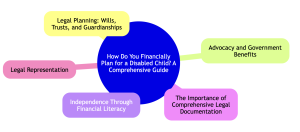Many families must financially plan for a disabled child – and that involves careful consideration of their future needs and financial security. Trusts, ABLE accounts, wills, savings, and guardianships are strong planning tools.
This guide from Montana Elder Law provides actionable steps and essential information to help you lay a strong foundation for your child’s well-being.
Key Takeaways
- A Special Needs Trust manages assets while maintaining eligibility for benefits.
- An ABLE account provides a tax-advantaged savings option for disability-related expenses.
- A will directs assets appropriately and protects your child’s financial future.
- Selecting a guardian ensures your child has someone trusted to look after them.
- Building personal savings is essential for covering costs not covered by other means.

Establishing a Financial Foundation for Your Child
Creating a financial plan for your child involves several key steps, starting with setting up suitable financial structures to protect their future.
A Special Needs Trust and an ABLE account are foundational elements of this plan.
Comparison of Special Needs Trust and ABLE Account
- Special Needs Trust: Allows for asset management without impacting eligibility for government assistance.
- ABLE Account: Offers a way to save for disability-related expenses without forfeiting benefits.
Essential Legal Steps: Financial Plan for a Disabled Child
You must take legal action to secure your child’s financial future. A will is necessary, and grasping how to distribute assets will keep your child eligible for government benefits. A blend of financial insight and legal expertise forms a foundation of protection for your child’s future.
Will and trusts are very important. Consulting with an attorney specializing in disability law can guide you through these processes. (1)
Legal Planning: Wills, Trusts, and Guardianships
Creating a will, establishing a trust, and appointing guardianships are critical steps for families planning for the future of a child with disabilities.
– Wills properly distribute your assets, providing for your child without affecting their eligibility for government benefits.
– Trusts offer a secure way to manage resources for your child’s benefit.
– A carefully chosen guardian can provide personal care and make decisions if you cannot.
Engaging legal professionals experienced in special needs planning is always recommended.
Financially Planning for a Disabled Child: Advocacy and Government Benefits
Understanding Government Benefits
To effectively support your child with disabilities, it’s essential to tap into specific government benefits tailored to their needs.
Programs like Supplemental Security Income (SSI) and Medicaid can offer financial aid and healthcare services.
Additionally, the Individuals with Disabilities Education Act (IDEA) provides educational benefits tailored to individual learning requirements.
The Role of Advocacy
For advocacy, study these government programs and your child’s rights.
Engaging with local support groups and utilizing resources from organizations like the National Disability Rights Network can empower your actions.
Actively participating in educational plan meetings and staying informed about policy changes are practical steps toward securing the best support for your child.
Independence Through Financial Literacy
Empowering your child with financial literacy is foundational for promoting independence.
Independence starts with teaching them about managing personal finances and understanding the value of money. Planning for adult living arrangements encourages self-reliance and confidence.
- Teach Budgeting Basics: Show them how to manage a budget for daily expenses.
- Introduce Banking Concepts: Open a savings account to teach about saving and interest.
- Explain the Importance of Planning: Discuss long-term financial planning and its benefits.
- Encourage Decision Making: Involve them in financial decisions to build their confidence.
- Plan for Future Living Arrangements: Discuss options and what they entail financially.
The Importance of Comprehensive Legal Documentation
Thorough legal documentation is the backbone of special needs planning.
Make a checklist of everything we discussed here: trusts, wills, power of attorney, etc. Make sure to keep it organized, and don’t push it off. It lays out clear plans and safeguards for your child’s future.
Montana Elder Law highlights the necessity of detailed, well-crafted documents to protect your child’s interests and ensure their needs are met without compromising their access to benefits or care.
Legal Representation: Financial Planning for Disabled Child
Choosing a legal representative specializing in special needs law is crucial for your family’s peace of mind and your child’s future well-being.
- Expertise in Special Needs Law: Look for a lawyer with deep knowledge of laws affecting those with special needs.
- Experience with Similar Families: Your ideal advocate understands the challenges and solutions for families like yours.
- Personalized Approach: They should offer tailored advice that fits your unique situation.
- Commitment to Your Child’s Best Interests: A great lawyer prioritizes your child’s long-term well-being above all.
Final Thoughts – Your Trusted Special Needs Planning Attorneys
Effective financial and legal planning is essential for the future of children with special needs.
Montana Elder Law dedicates itself to delivering detailed, personalized legal strategies.
As a trusted partner, they guide families through the planning process, making sure each child’s needs are met comprehensively.
Their commitment to thorough planning and specialized legal support offers families the reassurance and outcomes they deserve.
Click HERE for Montana Elder Law’s homepage.
Reference:
(1) Montana State University, Estate Planning for Families with Minor and/or Children with Special Needs, https://apps.msuextension.org/montguide/guide.html?sku=MT199117HR




